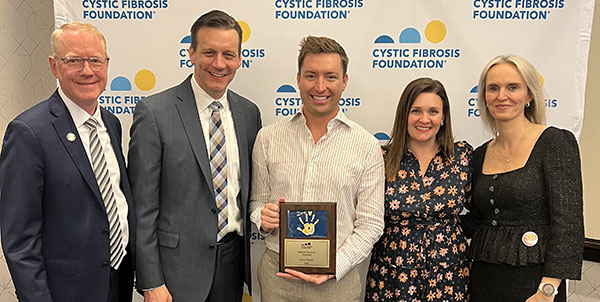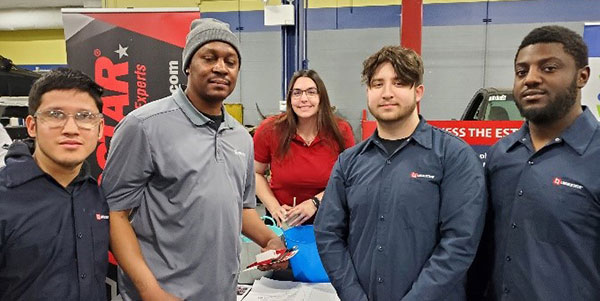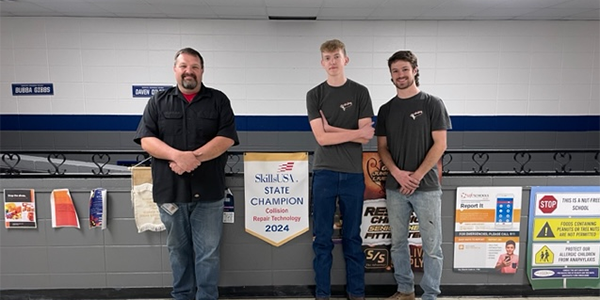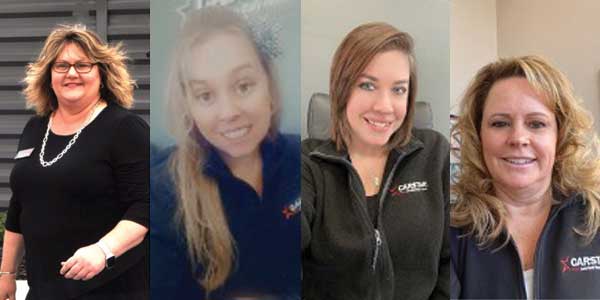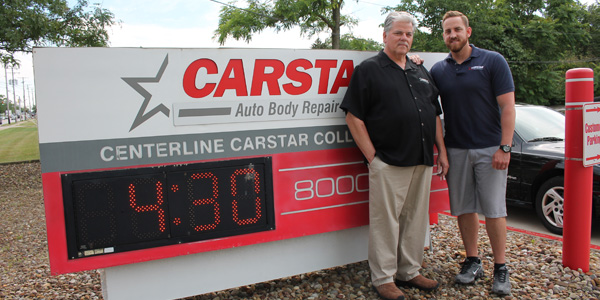
“Dad’s retiring next year.” So, what’s next?
A shrug. What’s the plan, anyway?
Sound familiar? When the older generation decides it’s time to put on the brakes, most body shops are not prepared with a strategy of how the next in line will transition into leadership and ownership.
“Junior is in the desk sitting across from Dad. He’s taken over the business, but there is no formal transition plan,” says Lee Rush, manager of business consulting, Sherwin-Williams.
While not true for all body shops, many that are in the position to pass the business to the next generation do so organically. The younger generation moves into administrative roles, overseeing operations. Gradually, the later generation takes baby steps back.
Rush meets with some businesses, the younger generation, to talk about business planning. The door closes, and the floodgates open. “They’re pouring out their hearts, their frustrations about the lack of transition.”
What’s necessary is to manage the family component – those are the complex dynamics related to running a family business that exist purely because family are involved.
“The very thing that makes family businesses strong to begin with is what could result in their demise when transitioning from generation to generation,” Rush says.
The benefits of family are loyalty, trust, accountability and passion for the business. But all of the feelings can get in the way when working to transition a business, Rush says. This could be the reason why 70 percent of businesses will not survive the second generation, according to his research. And, 90 percent will not make it to the third generation.
Some businesses simply didn’t plan to succeed into the future, let alone transition to the next generation, Lee points out. According to a survey by MassMutual Financial Group and the Raymond Institute, only 37 percent of family business owners reported having a written strategic plan, Rush points out.
Now, ready for some good news? Family-owned body shops that are successfully continuing their businesses into the next generation (and planning for the next, and next) share the opportunity that exists within the industry. And, importantly, these opportunities were communicated early on and openly.
That communication – including showing how the business provides a fulfilling career, a comfortable lifestyle – is coupled with honesty. That’s what BodyShop Business found when we talked to two family-owned body shops that share their succession success here.
Centerline CARSTAR Collision
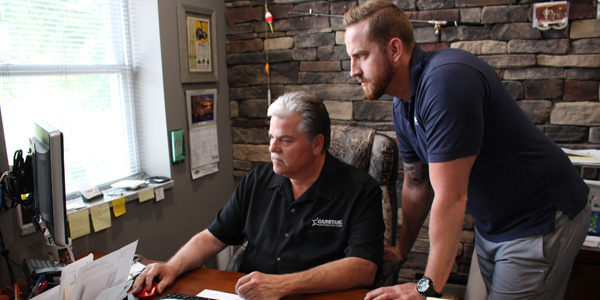
Paul Struhar Sr., owner
Paul Struhar Jr., production manager
In 1992, Paul Struhar Sr. read an advertisement in the local paper for a collision repair outfit that was for sale – an independent shop, Centerline Auto Body in Strongsville, Ohio. He had been working in body shops and held sales positions for distributors for the previous 18 years. He was looking for the next step in his career, and a way to provide for his family.
Struhar loves nothing better than working on cars. (He has three project cars in the works now. “I can’t keep my hands off of it!” he laughs.) This passion translated into a commitment to his business, and growing it over the years. His son, Paul Jr., and daughter were exposed at an early age.
“I never pushed working here, like, ‘Some day this will be yours,’” Paul Sr. says. “I figured, let them do their own thing. I would say, ‘This was my dream. If you want to have a dream of your own, I’ll fully support you in anything you want to do.’”
His daughter went to equestrian school and operates a horse farm. (She currently works part-time in the business.) Paul Jr. went to college, but returned to the shop to work full-time. He’s now running Centerline CARSTAR as general manager, overseeing business operations after learning every department – a process that began as a kid.
Seeing the Opportunity
Two and a half years ago, Paul Sr. decided to grow Centerline with a new addition that nearly doubled the size of the facility from 9,400 square feet of production space to 16,500. This prompted more planning about “what’s next” for the business. And, it was even more physical proof that the business held a significant amount of opportunity for Paul Jr.
“Growing up with Dad running the business, it provided for our family and we had a good life because of it,” Paul Jr. says. “I wanted to keep that going.”
Training Up
Paul Jr. started working in the business when he was young, sweeping floors. “My dad didn’t treat me any differently than other employees – I was never the boss’s son,” he says.
Paul Jr. says the business is “all I’ve ever known…I’ve been around it since I was little.”
When Paul Jr. was a teenager, Paul Sr. bought a couple of wrecked cars. “I let him do most of the work, and I would help him work on those on Saturdays,” he says. “We’d sell the cars and I would take my initial investment back. The money he made on the car he could reinvest into buying another car, and another. He found out pretty early on that if you work hard and do things right, you can really make some good money.”
Hands-on training continued during school years. “We had experience technicians here, so he learned a lot from watching what they do, and we have a quality-
control process here, so he learned that way,” Paul Sr. says.
Paul Jr. decided to work full-time in the business after graduating from high school and spending some time at college.
As Paul Jr. grew in the business, Paul Sr. would involve his son in important decisions – or any decision, for that matter. “I’d get with him and say, ‘OK, how would you handle this?’” Paul Sr. says. “Whether it’s a health insurance renewal or looking at a product or tool, I want his buy-in. I’m not going to go out and make a decision without getting his input because this will be his some day.”
Working the Transition
Paul Sr. has gradually transitioned leadership during the last couple of years, following the completion of the new addition. The process has happened organically for the most part.
Paul Sr. has no problem delegating, passing on responsibility. But what’s really hard is actually retiring. “I don’t want to!” he laughs. “I love what I do. I have three old cars I’m working on now, and one of them I’m building. I just can’t keep my hands off it! Even though I don’t work as much in the shop or office now, I’m messing around with project cars like I did 25 years ago.”
The Struhars sought advice from their insurance agent and financial adviser, their attorney and accountant. Paul Sr. will retain ownership of the property, “because that is part of my retirement income,” he says. “I’ll still get a check and my benefits, and some car benefits. So, I’ll retain my perks. I’m not writing the place over – but I’m not making it difficult.”
Paul Jr. is already handling daily operations. He manages the team, the processes, the business. Paul Sr. steps in daily for support. Meanwhile, he continues to be involved in the industry and promotes careers in collision by visiting local vo-tech programs.
“I am very passionate about the industry, and my son is, too,” Paul Sr. says. “Hopefully he learned that from me. He likes what he does and wants to continue to grow the business, and we talk about that all the time.”
Different Perspectives
How do the two generations work together? No two people manage an operation the same way, but having systems in place made for a smooth transition from father to son. Paul Sr. says he tends to be a more “laidback” owner, particularly because the pressure of daily operations is not his direct charge.
Paul Jr. enjoys overseeing the team and working with technicians and staff to improve efficiency and maintain quality. “I stay positive, and if we have a problem, it’s, ‘Let’s get it fixed, move on and learn from our mistake,’” he says.
Running a body shop is different today than when Paul Sr. first purchased Centerline. “This business has become so demanding, and there’s more pressure to perform,” Paul Sr. says. What alleviates that pressure is improving systems. “When you’re more efficient and have less waste, you have more control over the variables, which helps with pressure,” Paul Jr. says.
“Do we agree on everything?” Paul Sr. muses. “No. Paul Jr. has his own style, and that is what I want.”
Looking Ahead
Paul Sr. says there are a number of CARSTAR organizations that transition to younger generations. “Hopefully we are setting a good example,” he says.
He encourages more shop owners to consider their business as an asset – and future. “They should be proud of what they have, no matter how big or small their business is,” Paul Sr. says. “If they have family involved that they can let it go to, that is a built-in retirement program.”
Paul Jr. anticipates future growth, possible expansion. “My immediate goal is to get this shop to capacity and get the most of where we are now,” he says of the new facility. Perhaps down the road, they’ll set up an express center for smaller repairs.
It’s all about possibility with growing the business into the next generation. “We strive for continuous improvement, and every day we are trying to tweak things to make processes simpler and more efficient,” Paul Jr. says.
Ben Clymer’s The Body Shop
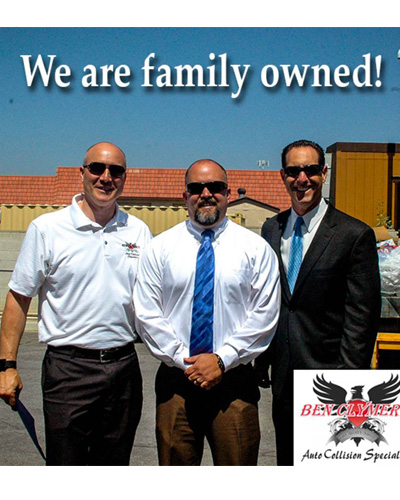
Bryan Clymer, CEO
Ben Clymer Jr., CFO
Brett Clymer, COO
In 1972, Ben Clymer Sr. opened a single body shop in Riverside, Calif. He worked with customers, serviced cars and grew a talented staff, including lead body and paint technicians. His wife, Debra, ran the office.
From day one, Clymer’s sons, Ben Jr. and Brett, worked in the body shop.
“We started from the ground up, and we were entrusted only with sweeping the floors and cleaning restrooms,” Ben Clymer Jr. says. “Once we proved we wouldn’t screw that up, we were allowed to learn to wash the cars. And, we kept on learning.”
While in high school, Ben Sr. asked his two sons which departments they would like to learn next. Brett chose to work under the lead body tech. Ben Jr. was interested in art, so he wanted to learn refinish and began apprenticing with the lead paint technician, first prepping vehicles and eventually learning to prime and then paint.
“I became the lead painter for our family-owned business for seven years before I came into the office,” Clymer says.
Both boys came into the office, as did their uncle (Ben Sr.’s brother), Bryan Clymer. Today, the three run five locations that employ about 80 people and share ownership of the business. Ben Sr. continues running the other business he started in 1992, Tiffany Coachworks, which builds custom limousines, shuttles and party buses.
Seeing the Opportunity
Before Ben Clymer Jr. turned 16, he had a savings account and his first car. “It was a used Camaro we bought for $500,” he says, relating that he made the repairs himself and got it ready before he could even take his driver’s test.
“Many of my friends were in school and getting summer jobs,” he adds, relating that he always had a job, always had a way to earn an income doing something he enjoyed. He realized how fortunate this was. “The business taught us at an early age what it means to do a hard day’s work and earn your own keep,” he says.
Ben Clymer Sr., “Pop,” was always a positive influence, Ben Jr. says. “We realized the opportunity to be involved in the industry, and became passionate about it as he is. I saw being involved in the family business as me and my brother being given a great opportunity.”
Training Up
Hands-on experience working in the shop is how the Clymer boys learned every aspect of the business. “It was no different than working for any other employer in terms of being held accountable,” Clymer says. Though, he adds, that family tends to be held to higher expectations.
Once the Clymers determined their career paths were to continue growing the business, and they had learned their way around the shop, they began taking on other duties.
Ben Jr. moved toward marketing and helping in the office with accounts payable and receivables, payroll and finances. Brett has a passion for the operations. Meanwhile, their uncle Bryan had relationships in the industry. “It made sense for him to be the CEO as far as acquiring new accounts,” he says.
They fell into natural roles with managing the business based on their strengths and interests.
Working the Transition
The toughest part about transitioning the business was not deciding who would do what. “When you have different locations that do different numbers, you can have the potential for those conversations (about shares) to go, ‘What does this mean for a percentage of shares?’” Clymer says.
They decided to become equal partners, dividing the shares amongst them. “We did internal financing,” he says, which made the financing process seamless.
The Clymer boys secured an attorney, and so did their dad. “That way we could be sure that everything was spelled out and everyone was in agreement.”
Different Perspectives » “It’s an exciting time to be in the industry, and it’s also a very different time than when my father first got into the business decades ago,” Clymer says.
Shops are more focused on metrics, for example. However, relating those metrics back to the customer experience is what’s important, he says.
“You always have to ask yourself, ‘Why? Why do we pay attention to things like cycle time and touch time?’ Is it because the insurance carrier cares about these things, or because the customer wants their car fixed and returned quickly?”
Seeing operational efficiency through the customer lens brings together technicians, the whole team, to work toward high performance.
Another difference between running the business today and in the past is the labor pool, Clymer says. “Millennials have grown up in a different environment, and that starts with the educational system.”
“If you are going to succeed, you have to work hard, and when you fail, pick back up and get at it again,” he adds. This is what the body shop industry teaches. And, the rewards are a fulfilling career and lifestyle. “Most shops have opportunities that range from minimum wage jobs all the way up to senior-level technicians that can make $140,000-plus a year in our neck of the woods,” he says.
Looking Ahead
“I think shop owners and our industry as a whole could do a better job with our messaging of how to attract future generations of the talent pool by letting them know what a diverse field we are in,” Clymer says.
He’s speaking of the various technical specialties within a shop, and the advancing that can happen if someone wants to learn and grow in a collision repair business. “This is a career path.”
Get with the Plan
Steering a business through transition to the next generation requires planning, emphasizes Lee Rush, manager of business consulting, Sherwin-Williams. The key is to understand and manage the family component. “It all boils down to effective communication,” Rush says. Here’s what’s involved.
Family Business Meeting
Set a formal meeting. Rush admits this can be tough. “Very little is formal in a family business, but to ensure successful outcomes, you have to formalize this management process,” he says. “That way, everyone will understand the company goals and the succession plan.”
Who attends? Every family member working in the business. “This includes those who have a vested interested and who are working in the business every day,” Rush says.
These meetings are focused on business. Set goals, discuss issues. Talk about how the business is performing. Assign a family member to coordinate, or chair, the meeting. Set a meeting place and time, and hold meetings on a regular basis.
Family Council Meeting
This includes the broader family, including those who are not active in the business on a day-to-day basis. The goal: Keep family members informed about the big picture. “This is not intended for decision-making or to discuss daily business issues or for making decisions,” Rush says. “This meeting is to say, ‘Here is the big picture. This is how things are going.’”
You might talk about whether the business is meeting sales goals, or what goals are for the coming year. “It’s a communication forum,” Rush says.
Family Business Plan
Now comes the formal plan. The written business plan should outline daily operations, along with short- and long-term goals and objectives.
“Business owners need to formalize daily operations, including creating job descriptions to help transition the business,” Rush says. “This is where we get into SOPs. Think of it as drawing a map to guide the next generation’s success.”










